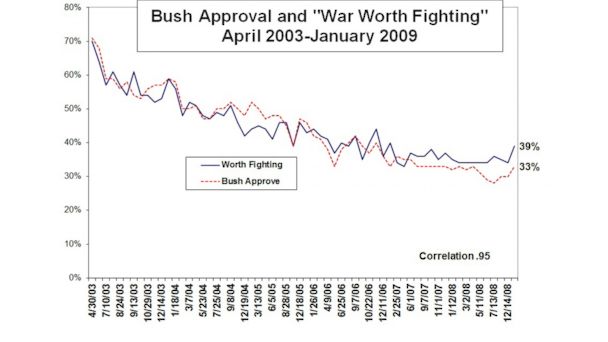Obama, Cheney and the War in Iraq
When President Obama says, as he did today, "American combat troops are not going to be fighting in Iraq again," he's reflecting not only his own policy preferences but also a steady theme in U.S. public opinion. And as former Vice President Dick Cheney and other Bush administration officials rejoin the debate, a look back at opinions on the war seems warranted.
Three key data points stand out: Steadily from late 2004 forward, a majority of Americans in ABC News/Washington Post polls saw the war in Iraq as "not worth fighting." That sentiment, in turn, paved the way for George W. Bush to rack up the most unpopular second term in modern polling history. And more recently, 78 percent supported Obama's decision to withdraw all U.S. forces from Iraq in 2011 - a rare level of political agreement.
The impact of an unpopular war on presidential approval is hardly news. Harry Truman's popularity dropped during the Korean War, as did Lyndon Johnson's during Vietnam; Bush's merely followed suit. It's a pattern Obama, understandably, may not wish to repeat.
Consider Bush: He averaged 37 percent approval in his second term. That compares with Bill Clinton's second-term average of 61 percent (despite the inconvenience of his having been impeached) and Ronald Reagan's 58 percent. Bush had the single highest disapproval score in polls dating to the mid-1930s, 73 percent in October 2008, and came within one point of the single lowest approval number on record, Truman's 22 percent in February 1952. (Bush, as it happens, also had the highest approval on record, 92 percent, in a post-9/11 rally during his first term.)
Cheney, back in the fray this week, saw his ratings largely follow those of his boss. At the time he left office, just 30 percent of Americans in ABC/Post polling approved of Cheney's job performance as vice president. Twice as many, 60 percent, disapproved.
In an interview with ABC's Martha Raddatz in March 2008, Cheney dismissed public attitudes about the war, saying, "you cannot be blown off course by the fluctuations in the public opinion polls." But there wasn't much fluctuation at all: Views on whether the war was worth fighting turned negative in December 2004, grew to a sizable majority and simply stayed there. Steadily from December 2006 through the end of the Bush administration, 58 to 66 percent of Americans said that given its costs vs. benefits the Iraq war was not worth fighting. It remained 58 percent at our last check, in March 2013.
Above all else, moreover, the war's unpopularity infected Bush's second term. Views on whether the Iraq war was worth fighting correlated with the president's approval rating at a remarkable .95, a whisker from a perfect match.

Cheney this week announced formation of an organization intended to "advocate for the policies needed to restore American power and preeminence." The public, for its part, saw harm to America's image during his time in office. In ABC/Post polls from 2003 through 2006, majorities said the war had "damaged the United States' image in the rest of the world" - peaking at 76 percent in 2004 and 2006 alike. Similarly, in July 2008, 82 percent said the country's image had deteriorated under Bush's presidency.
Dissatisfaction with the war, and resulting damage to the Bush administration, was not solely about costs or casualties. At times in ABC/Post polling in 2005 and 2006, majorities of Americans, peaking at 55 percent in November 2005, said they believed that in making its case for war with Iraq, the Bush administration had "intentionally misled the American public."
The blowback was not limited to the administration; it hit the Republican Party more broadly, with impacts still being felt. A generation of advances had brought the GOP, in 2003, to parity with the Democrats in partisan allegiance - a kind of political holy grail. Starting in 2004, that long-term pattern broke; Republican allegiance tanked - and it's yet to recover.
All worth considering as the debate over Iraq in particular - and American military engagement more generally - begins anew.
